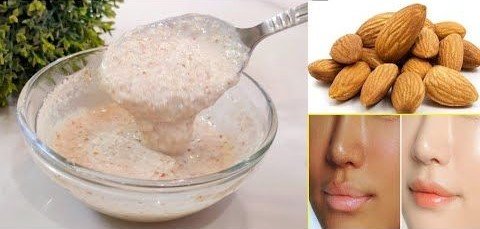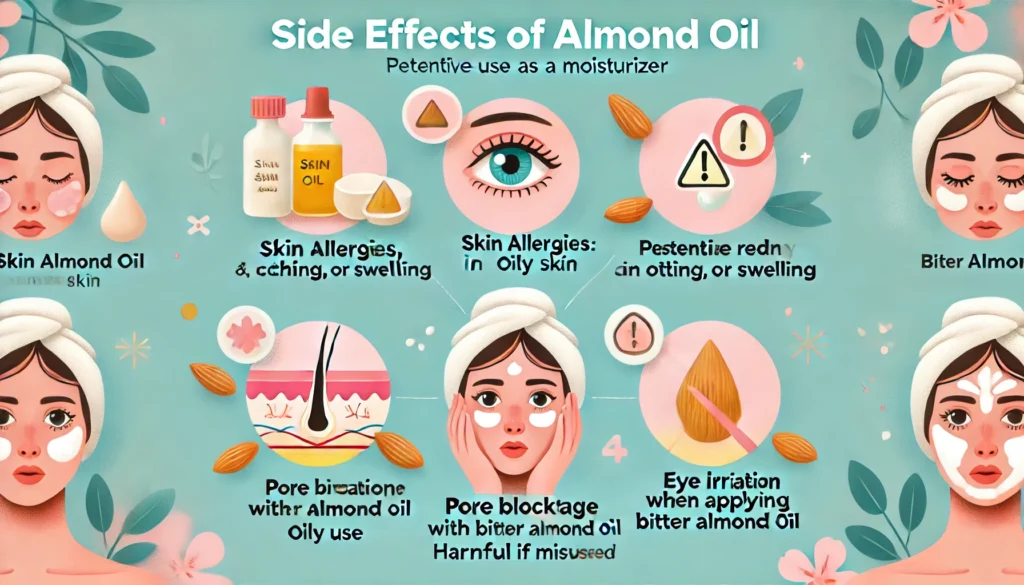Introduction:
Almond oil has gained popularity in skincare routines for its natural moisturising properties. Derived from almonds, this oil is packed with vitamins, antioxidants, and fatty acids that nourish and protect the skin. Let’s explore its types, uses, and benefits almond oil as a moisturiser for radiant skin.
NIVEA Almond, Family Care Sensitive Moisturising Cream, Body Cream for Dry Skin, Sensitive Skin Moisturiser with Natural Almond Oil, Suitable for the Whole Family, 450 ml (Pack of 1)
£7.78 in stock
Almond Oil as a Moisturiser

Table of Contents
1. What is Almond Oil?
Almond Oil as a Moisturiser

Almond oil is extracted from raw almonds through a process called cold pressing. Known for its high content of vitamin E, fatty acids, and antioxidants, almond oil is especially valued in skincare due to its hydrating, softening, and anti-inflammatory qualities. It penetrates deeply, making it a perfect choice for keeping skin healthy, smooth, and well-moisturised.
Two primary types of almond oil are used in skincare: sweet almond oil and bitter almond oil. Each type has unique properties and benefits.
2. Top Almond Oil Moisturisers Available in the UK
If you’re looking for high-quality almond oil as a moisturisers, here are some top brands available in the UK:
- Neal’s Yard Remedies Sweet Almond Oil: This organic almond oil is cold-pressed and ideal for use as a moisturizer. It’s perfect for all skin types and helps nourish and hydrate the skin.
Neal's Yard Remedies | Almond Oil Moisturise & Soothing Sensitive Skin Care With Oleic (Omega 9)| 100ml
£10.00 in stock
- The Body Shop Almond Milk Body Butter: Known for its rich and creamy texture, this body butter is infused with almond milk and oil, providing deep hydration and nourishment.
THE BODY SHOP Almond Milk Butter for Dry and Sensitive Skin: 96 hours moisture, 50 ml
- Aveda Botanical Kinetics™ Hydrating Lotion: This lightweight lotion combines almond oil with other botanical ingredients, offering a refreshing way to hydrate the skin.
Aveda Botanical Kinetics Hydrating Lotion 16.9 oz
- L’Occitane Almond Milk Concentrate: A luxurious option, this moisturiser combines almond oil and milk for rich hydration, promoting smoother and firmer skin.
L'OCCITANE Almond Milk Concentrate 200ml | Enriched with Almond Oil | Vegan & 95% Readily Biodegradable | 48 Hour Hydration | Clean & Luxury Beauty Bodycare for All Skin Types
£36.40 in stock
3. Types of Almond Oil

Types of Almond Oil
1.Sweet Almond Oil
2.Bitter Almond Oil
- Sweet Almond Oil: Widely used in skincare, sweet almond oil is gentle and rich in nutrients, ideal for sensitive and dry skin. It is non-irritating and has moisturising properties that make it a popular choice in creams, lotions, and serums.
- Bitter Almond Oil: Less common in skincare, bitter almond oil has a distinct aroma and contains amygdalin, which can be toxic if not processed correctly. It is typically used in aromatherapy and fragrances rather than directly on the skin.
4. Difference Between Sweet Almond Oil and Bitter Almond Oil

Sweet Almonds

Bitter Almonds
Understanding the difference between these two oils is essential when choosing a product for your skincare routine:
- Sweet Almond Oil: Safe, mild, and suitable for skin, this oil is packed with vitamins and is often the primary choice in moisturisers. Its soothing nature makes it ideal for all skin types, especially sensitive skin.
- Bitter Almond Oil: Although it contains antioxidants, bitter almond oil is not commonly used on skin due to the presence of amygdalin, a compound that can release cyanide when processed. Always verify if the oil is processed for topical use before applying it directly to the skin.
5. Benefits of Almond Oil as a Moisturiser
Almond oil boasts several benefits that make it an outstanding choice for skincare:

- Deep Hydration: Almond oil’s emollient properties help lock in moisture, providing long-lasting hydration. It penetrates deeply into the skin, making it ideal for dry and dehydrated skin types.
- Skin Barrier Protection: The oil forms a protective barrier on the skin, shielding it from environmental pollutants and preventing moisture loss. This helps maintain skin elasticity and reduces the appearance of fine lines and wrinkles.
- Rich in Antioxidants: Almond oil contains vitamins E and A, both of which are potent antioxidants. These nutrients protect the skin from oxidative stress and environmental damage, promoting a healthy, youthful appearance.
- Non-Comedogenic: Almond oil is lightweight and non-comedogenic, meaning it won’t clog pores. This makes it suitable for oily and acne-prone skin when used in moderation.
- Soothes Inflammation: With its anti-inflammatory properties, almond oil can help calm irritated skin and reduce redness, making it beneficial for conditions like eczema and psoriasis.
- Improves Skin Tone: Regular use of almond oil can enhance skin texture and promote an even skin tone. It helps to fade dark spots and discoloration over time.
- Promotes Skin Elasticity: The essential fatty acids in almond oil can improve skin elasticity, helping to prevent sagging and the formation of wrinkles.
- Reduces Dark Circles: When applied around the eyes, almond oil can help reduce the appearance of dark circles and puffiness due to its nourishing properties.
- Natural Makeup Remover: Almond oil can effectively remove makeup without stripping the skin of its natural oils, making it a gentle option for cleansing.
6. How to Use Almond Oil as a Moisturiser

Incorporating almond oil into your skincare routine is simple:
- Direct Application: After cleansing your face, apply a few drops of sweet almond oil directly to your skin. Massage it gently until fully absorbed. This can be done in the morning and evening for maximum hydration.
- Mix with Other Products: You can enhance your existing moisturizer by adding a few drops of almond oil. This not only boosts hydration but also enhances the effectiveness of your skincare products.
- Night Treatment: Use almond oil as a nighttime treatment by applying it as the last step in your skincare routine. This allows the oil to work overnight, deeply nourishing your skin.
- DIY Face Mask: Combine almond oil with natural ingredients like honey or yogurt to create a hydrating face mask. Apply it to your skin for about 15-20 minutes, then rinse off for a boost of moisture.
7. Almond Oil for Skin Whitening

Almond oil can help with skin brightening and evening out skin tone. Rich in vitamin E, it aids in reducing hyperpigmentation and dark spots, giving the skin a brighter and healthier appearance. Consistent use can improve dull, uneven skin and restore a natural glow. Although almond oil alone won’t drastically lighten the skin, it can gradually reduce discoloration and support a more radiant complexion.
8. Dark Spot Removal with Almond Oil

Almond oil is beneficial for reducing dark spots and blemishes. The vitamin E content helps lighten hyperpigmentation, making it an effective, natural option for targeting uneven skin tone. Here’s how to use it:
- Targeted Treatment: Apply a small amount of almond oil directly to dark spots and leave it on overnight. With regular use, it can gradually reduce the appearance of dark areas.
- DIY Spot Treatment: Mix almond oil with a drop of lemon juice for a natural lightening treatment. Apply sparingly and avoid sun exposure immediately after use.
9. Side Effects of Almond Oil as a Moisturiser

While almond oil is generally safe, it can cause reactions in some people. Here’s a detailed look at potential side effects:
- Allergic Reactions: Those with nut allergies should avoid almond oil or do a patch test first. Redness, itching, or swelling indicates an allergy.
- Risk of Pore Blockage for Oily Skin: Although almond oil is non-comedogenic, overuse may clog pores for those with oily or acne-prone skin.
- Eye Irritation: If applying almond oil near the eyes, avoid direct contact with the eyes to prevent irritation.
- Ingestion Concerns with Bitter Almond Oil: Avoid using unrefined bitter almond oil on the skin due to its potential toxicity. Stick to sweet almond oil for skincare to ensure safe use.

Conclusion
Almond oil as a moisturiser offers numerous benefits, from deep hydration and antioxidant protection to skin-brightening effects and anti-inflammatory relief. Whether you’re looking to hydrate, improve skin tone, or address dark spots, almond oil can be a valuable addition to your skincare routine. Just remember to choose the right type, perform a patch test, and follow recommended application methods for optimal results.










